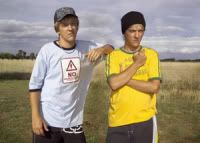The Nominees: The Final Episode
There was a structural difference between Summer Heights High and The Nominees which ended this week on FX channel.
All the characters and action in Summer Heights took place in a school, which I suppose qualifies it as a 'sit-com' although I prefer to call it a 'comedy drama'. Or, to be strictly accurate, a 'mock-doc comedy drama.'
In contrast, The Nominees followed the lives of six characters living in different parts of Australia and only put them under the same roof at the awards nomination ceremony in the final episode. Chris Lilley teased us here by having Daniel eyeing up Ja'ime and describing her as a "hot-looking chick". I thought some interaction was going to follow, no doubt with Ja'ime dismissing him as a povvo bogan, but it never happened.
Perhaps the fact that the six characters were only linked by their nomination for Australian of the Year is why it was less successful than Summer Heights. It's slower, gentler, more discursive, with fewer breathtaking moments. If it has its occasional longueurs, then so do real documentaries. "The Family", currently on Channel 4, which I mentioned recently is surely one of the most boring documentaries ever made. But I still think The Nominees is a very impressive piece of work that merits more than one viewing to appreciate the detail and sharp observation that's so characteristic of Chris Lilley.
In this last episode, Ricky Wong, torn between physics and acting, finally opts for the latter. He auditions for the part of a lifeguard in Home and Away and this reminds us of a memorable line in an earlier episode: "Sometimes I forget I'm Chinese." Many of Chris Lilley's characters are studies in self-delusion and here the skinny, glasses-wearing Ricky believes he'll be chosen for the part rather than the all-Australian surfer hunks who are his fellow auditionees.
Chris Lilley brings not just realism but humanity and even love to many of his characters. This contrasts with many British character comedians whose characters are either one-dimensional caricatures or downright vicious, often class-based, mockeries of stereotypes.
Pat Mullins and her husband Terry are an affectionate celebration of the odd and the ordinary. One almost feels guilty at laughing at Pat and her disability-conquering endeavours at the bizarre and hitherto unknown sport of long-distance rolling. Perhaps more than with any other character, I experienced a 'suspension of disbelief', able to forget that this was Chris Lilley playing a middle-aged woman. She and Terry are an odd couple but no odder than many of the people in one's own street. No odder perhaps than you or I. Like most things, oddness and eccentricity are relative.
The revelation in the final episode that Pat had died was the occasion for a brilliant and moving performance by Mick Graham as her husband Terry.
As in Summer Heights, the supporting cast are uniformly outstanding. Talking of which, how long did they search to find Ja'ime's mother? In both series, she has hardly any lines but - and this is cruel to the actress who played her - you only have to look at her pinched, sucking-on-a-lemon face to start laughing.
After the pathos of Pat's death came the bathos of the final scene.
That final scene is an example of Chris Lilley at his absolute best.
Daniel and Nathan and their brothers and sisters are in a field letting off the last of the fireworks they bought in Canberra. Stupidly, they are doing so in broad daylight. The camera pans across the sky vainly searching for invisible fireworks. Then, with one final raised finger to the camera from Nathan, they walk off across the cornfield, accompanied by the choral music that Chris Lilley likes so much.
That final wide shot of them receding into the distance lasts for over a minute. A minute is not particularly long in a feature film. But in a half hour television programme, a minute is an eternity. If you're brave enough to do it, holding a single shot that long is a perfectly simple thing to do but the result in this case was simply perfect.
This final scene is a fine example of the power of calculated anti-climax. What Chris Lilley does is a subversion of the obvious. If you or I, or just about anyone else, had been writing that scene, we'd have gone for some spectacular pyrotechnics lighting up the night sky. For, to paraphrase T.S. Eliot, this is not how to end a series: not with a bang but a whimper.
But if those dismal, unseen fireworks were a metaphor for the preceding litany of unfulfilled dreams and self-delusion, the cheerful resignation of those kids trudging home across the fields to resume their ordinary, uneventful lives unseen and unchronicled was somehow more triumphant than tragic, a statement about the unrecognised, everyday heroism of making the best of things and finding pleasure where you can.
 The Nominees is the series Chris Lilley made before Summer Heights High and is currently showing Thursdays on FX.
The Nominees is the series Chris Lilley made before Summer Heights High and is currently showing Thursdays on FX. Terry Coleman's wonderful work of social history The Railway Navvies was first published when I was a teenager. A teacher spent an hour enthusing about it, even though it had nothing to do with our syllabus, and ever since reading it I've been fascinated by the incredible engineering feat of the building of our railway network in the 19th century.
Terry Coleman's wonderful work of social history The Railway Navvies was first published when I was a teenager. A teacher spent an hour enthusing about it, even though it had nothing to do with our syllabus, and ever since reading it I've been fascinated by the incredible engineering feat of the building of our railway network in the 19th century.